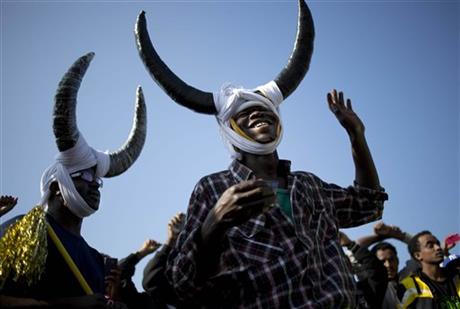
By IAN DEITCH
African migrants protest in front of the American Embassy demanding asylum and work rights from the Israeli government, in Tel Aviv, Israel, Monday, Jan. 6, 2014. About 60,000 African migrants, mostly from Sudan and Eritrea, have trekked through Egypt and other Muslim countries to reach Israel in recent years. Some are fleeing violence or oppression in their home countries while others are seeking better economic opportunities. The migrants, some of whom are menial laborers in Israel, have been on a three-day strike. (AP Photo/Ariel Schalit)
Mideast Israel African Migrants
Thousands of African migrants protest in front of the American Embassy demanding asylum and work rights from the Israeli government, in Tel Aviv, Israel, Monday, Jan. 6, 2014. About 60,000 African migrants, mostly from Sudan and Eritrea, have trekked through Egypt and other Muslim countries to reach Israel in recent years. Some are fleeing violence or oppression in their home countries while others are seeking better economic opportunities. The migrants, some of whom are menial laborers in Israel, have been on a three-day strike. (AP Photo/Ariel Schalit)
Mideast Israel African Migrants
Thousands of African migrants protest in front of the American Embassy demanding asylum and work rights from the Israeli government, in Tel Aviv, Israel, Monday, Jan. 6, 2014. About 60,000 African migrants, mostly from Sudan and Eritrea, have trekked through Egypt and other Muslim countries to reach Israel in recent years. Some are fleeing violence or oppression in their home countries while others are seeking better economic opportunities. The migrants, some of whom are menial laborers in Israel, have been on a three-day strike. (AP Photo/Ariel Schalit)
Prev 1 of 3 Next
JERUSALEM (AP) — Thousands of African migrants in Israel marched up to the embassies of the United States and European countries on Monday to demand asylum and work rights from the government.
About 60,000 African migrants, mostly from Sudan and Eritrea, have made the long journey trekking through Egypt and other Muslim countries to reach Israel in recent years. Some have fled the violence or oppression in their home countries while others have sought a better life and more economic opportunities in Israel.
About 10,000 people took part in Monday’s march, police said. The migrants, many of whom are menial laborers in Israel, have been on a three-day strike. On Sunday, more than 13,000 of them rallied in central Tel Aviv.
The migrant influx has sparked tensions with some Israelis who blame them for thefts, violent crimes and for transforming the Jewish identity of some neighborhoods. Many of the African migrants have settled in a neighborhood near the bus station in southern Tel Aviv, where longtime residents say they feel threatened.
Dawit Domuz from Eritrea told Israel Radio he had escaped danger in his home country to reach the Jewish state.
“We arrived in Israel seeking asylum and we want the Israeli government to check our asylum request in a transparent way,” he told the station in perfect Hebrew. “They should grant us basic rights until we can return to our countries.”
The migrants are seeking refugee status from the Jewish state. But according to Sigal Rozen of the Hotline for Migrant Workers advocacy group, only a few hundred, all being held in detention centers, have even been allowed to apply.
Of those, “not a single Eritrean or Sudanese” has been approved, she said. Sudanese applicants have not received replies, she said, and a small number of Eritrean cases have been rejected. She said Israel has told the Eritreans that years of forced conscription they will face if they return home is no reason to stay.
Israeli Prime Minister Benjamin Netanyahu said Monday “no demonstration or strike will help.” Speaking to members of his Likud Party, he said: “We are determined to expel everyone who got in here before we closed the border.” Over the past year, a new fence built along the Egyptian border has all but halted the influx of Africans.
In a statement, Israel’s Foreign Ministry said that Israel “tries to balance the need to control its borders with the need to protect the human rights of those who enter.”
It said the government is giving all applications “thorough treatment” in accordance with international legal obligations. “Enforcement is carried out under Israeli law and in conformity with Supreme Court rulings,” it said.
Tel Aviv Deputy Mayor Arnon Giladi told Israel Radio that the migrants crossed into Israel through Egypt and hence that country should be responsible for granting asylum status. He said they arrived in Israel for financial reasons.
“They are not refugees,” Giladi said. “They are economic migrants, they are not more than that.”
The government has offered incentives for migrants to leave but is unable to deport most of them because they would face harm if they returned to their countries of origin.
The migrants, along with their supporters from Israeli rights groups and others, gathered outside the U.S. Embassy near the Tel Aviv promenade on Monday. Some waved their national flags while others carried makeshift cardboard signs reading, “freedom, not prison,” and “nobody chooses to be a refugee.”



